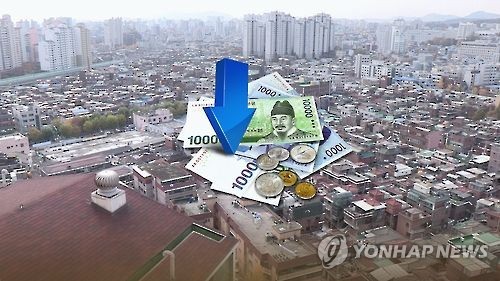South Korean households' real income and spending retreated last year from a year earlier amid a protracted economic slowdown, a government report showed Friday.
An average household earned 4.4 million won ($3,862) per month in 2016, up 0.6 percent from the previous year, according to the report by Statistics Korea.

But the inflation-adjusted real income fell 0.4 percent on-year over the one-year period, while the country's consumer prices index inched up 1 percent throughout the year.
At the same time, households' consumption edged down 0.4 percent on-year to an average 3.36 million won last year, with their real spending dropping 1.3 percent on-year.
The average consumption propensity, or the ratio of total consumption spending to disposable income, stood at 71.1 percent, down 0.9 percentage point from a year earlier, while disposable income climbed 0.7 percent on-year to 3.59 million won.
The statistics office said South Korean people tightened their belts due to a lingering slump in Asia's fourth-largest economy, which grew 2.7 percent in 2016, with its backbone exports slumping 6.4 percent on-year.
Also, the country has been struggling to revive local spending as the consumer sentiment has been frozen following the latest political turmoil stemming from the corruption scandal involving President Park Geun-hye.
Spending on groceries and nonalcoholic beverages fell 1.3 percent on-year and that on clothing and shoes decreased 2.4 percent on-year, while expenditures on entertainment and communications services also fell by 0.2 percent and 2.5 percent, respectively.
But spending on food and accommodations rose 1.4 percent last year and expenditure on cigarette and alcoholic drinks jumped 5.3 percent.
For the fourth quarter alone, average household income grew 0.2 percent on-year to 4.31 million won, but fell 1.2 percent on an inflation-adjusted basis.
In the October-December period, average household consumption propensity dropped 2.6 percentage points to 69.7 percent as their average consumption spending slid 3.2 percent on-year to 2.47 million won and disposable income rose 0.4 percent on-year to some 3.54 million won, the report showed. (Yonhap)




![[Weekender] Korean psyche untangled: Musok](http://res.heraldm.com/phpwas/restmb_idxmake.php?idx=644&simg=/content/image/2024/05/02/20240502050841_0.jpg&u=)

![[Eye Interview] 'If you live to 100, you might as well be happy,' says 88-year-old bestselling essayist](http://res.heraldm.com/phpwas/restmb_idxmake.php?idx=644&simg=/content/image/2024/05/03/20240503050674_0.jpg&u=)










![[Herald Interview] Director of 'Goodbye Earth' aimed to ask how we would face apocalypse](http://res.heraldm.com/phpwas/restmb_idxmake.php?idx=652&simg=/content/image/2024/05/03/20240503050732_0.jpg&u=)
